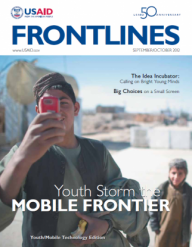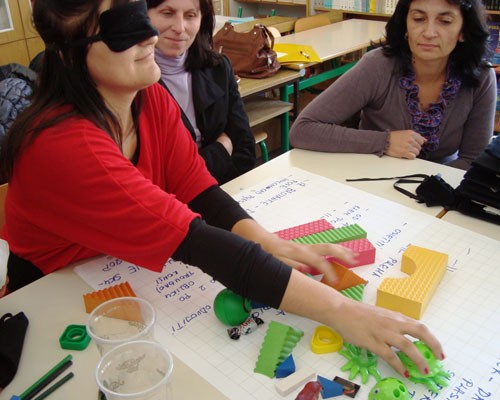 Learning the Braille system using an instructional tablet
Zorica Toncic Vucinic
Learning the Braille system using an instructional tablet
Zorica Toncic Vucinic
 Learning the Braille system using an instructional tablet
Zorica Toncic Vucinic
Learning the Braille system using an instructional tablet
Zorica Toncic Vucinic
Goran Macanovic, the director of the Association of the Blind and Sight-Impaired of Niksic, is trying to get a group of primary school teachers to imagine what it is like to be a blind child. The teachers put on blindfolds and try to accomplish the tasks set before them—molding clay animals and arranging wooden pegs in an oversized Braille tablet. They struggle, as Macanovic has intended them to do.
“Braille is a way for blind kids to navigate the visual world on their own terms,” explained Macanovic, who is himself blind.
The teachers are among 280 from 26 different primary schools in the Niksic region of Montenegro who have participated in a series of education seminars designed to prepare them to teach Braille to blind and sight-impaired pupils.
The project is supported by USAID and the educational non-profit organization ORT America through the Persons with Disabilities Initiative, a program aimed at strengthening the delivery of essential social services to persons living with disabilities.
In Montenegro, not so long ago, a blind or sight-impaired child would be kept at home by his parents or sent to a specialized school for children with disabilities. But that is changing.
Eager to join the European Union, Montenegro has been adopting EU policies, including inclusive education for children with disabilities. As a result, over the past four or five years, hundreds of blind and sight-impaired children have started entering mainstream schools.
The training courses for teachers—which are embraced by Montenegro’s national school system—are timely. Although Montenegro’s population of 620,000 includes almost 1,000 people who are completely blind and 20,000 who are sight-impaired, there is a chronic shortage of teachers to teach Braille. This means that blind and sight-impaired children struggle to keep up at school and must rely on electronic reading programs or have other students read to them.
In Montenegro, there are only two Braille textbooks available at the secondary school level: One dates back to 1976; the other is a Serbian textbook that omits two letters in the Montenegrin alphabet.
“That’s why courses like this are essential,” said Vera Mirkovic, one of the primary school teachers attending the two-day Braille training course. “We have to be prepared to help these children the best way we can.”
Although technological advancements such as electronic reading programs and computer applications are leading to a worldwide decline in the use of Braille, educators such as Macanovic are adamant that learning Braille is still essential to independence (and to attaining full literacy) within the blind community.
Macanovic notes that sighted people have not abandoned pens and paper even though many use computer keyboards. Although technology is a useful tool, Macanovic notes that it has limitations. Synthesized reading programs verbalize punctuation, making it difficult to understand the flow of a piece of writing. With Braille, readers’ fingers skim over commas and parentheses as sighted persons’ eyes do when reading text.
There is also the danger of overreliance on technology, which leads to a decline in the overall independence of the blind person. A 2009 U.S. study found that 89 percent of teachers of the blind believed that technology should be a supplement to Braille rather than a replacement. More importantly, U.S. studies indicate that Braille users are more likely to find work because they have greater levels of literacy.
“When I went to law school, I had to rely on a friend of mine to read me all the course materials. Only in this way, was I able to prepare to sit for my exams,” Macanovic said.
He adds that his friend was in a wheelchair, so he would help him up the stairs to the main faculty building as a sort of quid pro quo.
“But I didn’t like having to rely so heavily on other people, so I began to learn Braille. I wish there had been textbooks in Braille during my time at college—it would have all been so much easier,” he said.
Nowadays, Macanovic uses Braille at home to denote what drinks are in which container and which ordinary household objects are in which drawer. “It means that I can be more independent in my own home, and don’t have to rely so much on my wife and two children,” he said.
Macanovic wants that sense of independence for a whole new generation of blind and sight-impaired children in Montenegro.
The Braille Boost
Studies have shown that blind and visually impaired children who learn Braille at a young age perform on par with their sighted classmates at school and go on to be more competitive in the job market than their peers who did not learn Braille. In the United States, for example, 90 percent of those who are Braille-literate are employed, compared to the 33 percent of blind people who do not know Braille. Not only is it an essential skill in school, it is a critical tool for blind and sight-impaired people to participate fully in the social, economic and educational life of their communities.
The Montenegro Ministry of Education seems to agree with Macanovic. It has granted full accreditation to the Association of the Blind and Sight-Impaired of Niksic for its Braille teacher-training course.
The Braille education seminars piloted under the USAID/ORT initiative in three municipalities are now expected to be offered to all schools throughout Montenegro. The association also will be the sole provider of Braille education in the school system and will receive state funding for its program wherever it is implemented.
Accreditation allowed Macanovic to retroactively award certificates of competence to the 280 school teachers who have already completed the Braille education course. This certificate will likely benefit the teachers in terms of professional recognition, salary negotiations and career advancement. But the teachers going through this course know the true value of what they are learning.
“I would have paid good money for a course like this, no question in my mind,” said Mirkovic, who teaches at the Dusan Djukanovic Primary School in Niksic. “If it means ending the isolation of even just one child, then of course it is worth it.”
Claire Vukcevic is chief of party for ORT Montenegro












Comment
Make a general inquiry or suggest an improvement.